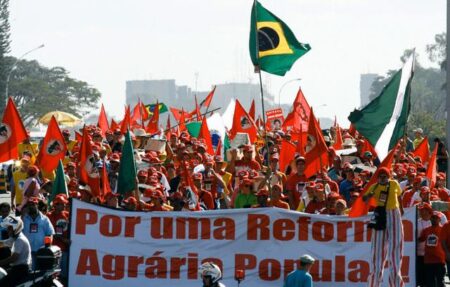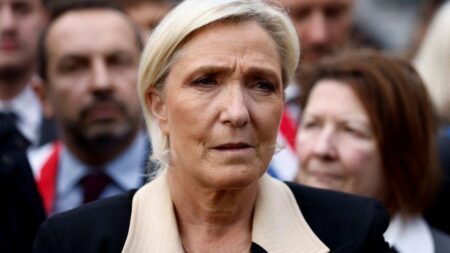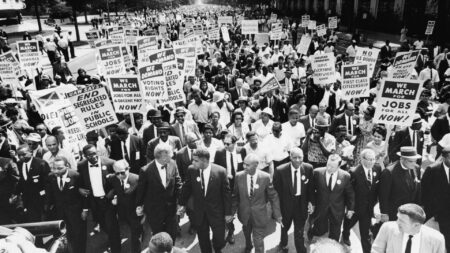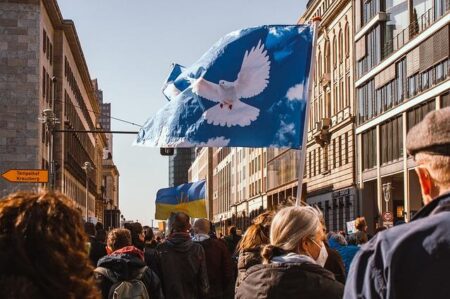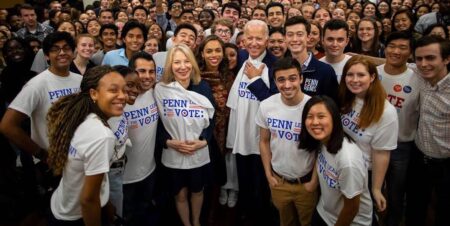Brazil’s Landless Workers’ Movement symbolizes the struggle for agrarian reform and social justice. By occupying unused land, the movement empowers marginalized communities, challenging systemic inequality and advocating for sustainable farming practices nationwide.
Browsing: social movements
Germany has invoked post-Holocaust doctrine to justify the deportation of pro-Palestinian protesters, citing concerns over rising antisemitism. The move has sparked controversy, with critics alleging it undermines free speech and civil rights.
The recent court verdict against Marine Le Pen has sparked outrage among far-right factions in France and beyond. Supporters claim the ruling exemplifies political bias, while critics view it as a critical step towards accountability for populist leaders.
In PM Keir Starmer’s constituency, tensions have escalated amid rising pro-Palestine activism. As protests gain momentum, local community reactions reveal a divide, prompting discussions about free speech and political responsibility within the Labour party.
On the anniversary of Argentina’s military dictatorship, thousands gathered in Buenos Aires, echoing the call for “memory, truth, and justice.” The United Human Rights Movement emphasizes the enduring fight against impunity and the importance of remembering victims.
Tens of thousands across France took to the streets in a robust demonstration against racism and far-right ideologies. The protests highlight growing concerns over social inequality and discrimination, as citizens demand government action to address these issues.
In the 1930s, a bold movement sought to merge the US, Canada, and Greenland, envisioning a unified North America. This initiative highlights historical aspirations for regional cooperation, echoing modern discussions on trade, environmental challenges, and cultural ties.
Supporters of former President Jair Bolsonaro gathered in Brazil, demanding amnesty for those involved in the January 8 riots. The rally reflects ongoing political tensions as protesters seek leniency for acts that challenged the nation’s democracy.
Tens of thousands of anti-government protesters gathered in Belgrade, demanding political change and accountability from their leaders. The massive turnout reflects growing public frustration over corruption and economic challenges facing the nation.
Many Chinese observers perceive a cultural revolution unfolding in the United States, marked by heightened political polarization, social justice movements, and shifting norms. This evolving landscape prompts reflections on their own societal dynamics and values.
Far-right leaders converged in Spain, uniting under the banner of “Make Europe Great Again.” This rally underscored the rising influence of nationalist movements across the continent, as participants advocated for strict immigration policies and national sovereignty.
In today’s authoritarian India, finding freedom requires resilience and creativity. Activists harness technology to mobilize grassroots support and challenge oppressive policies. Community solidarity and art as resistance serve as vital tools in the pursuit of liberty.
In “Triumph of Il Duce,” The Times explores Italy’s complex relationship with Mussolini, highlighting how nostalgia for his era persists amidst ongoing debates about fascism, identity, and historical memory in modern Italian society.
The People’s Union USA is spearheading a nationwide initiative known as the “Economic Blackout,” urging citizens to halt spending in protest of economic injustices. This movement aims to amplify calls for systemic change and greater equity across the nation.
Young voters in Germany are increasingly turning to the far-right Alternative for Germany (AfD) party, driven by concerns over immigration, economic instability, and climate change. This shift marks a significant change in the political landscape, challenging traditional parties.

